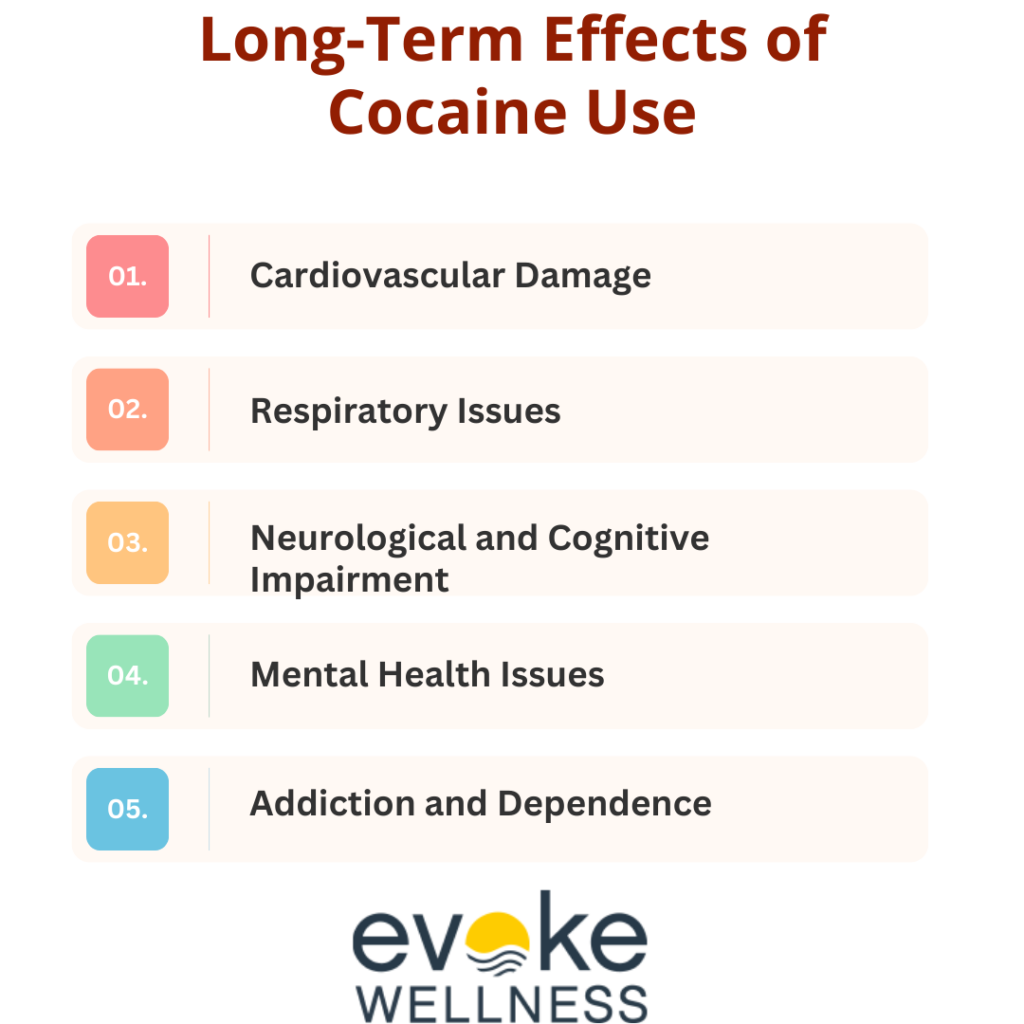Cocaine is a powerful stimulant that directly affects the brain and central nervous system. Known for producing intense euphoria and heightened energy, it has a high potential for abuse and addiction. While its initial effects may seem attractive, cocaine use comes with significant short- and long-term risks that can profoundly affect physical, mental, and emotional well-being. Understanding the nature of cocaine, its classification, and the dangers it poses is crucial for those seeking help or hoping to support a loved one.
At Evoke Wellness at San Marcos, we offer specialized treatment through our Cocaine Addiction Treatment Programs designed to address the complex challenges associated with cocaine addiction and provide a pathway to lasting recovery. Let’s embrace the journey to recovery and the promise of a new beginning. Call us at (833) 503-0734 today or reach out online.
Cocaine: A Potent Central Nervous System Stimulant
Cocaine is classified as a stimulant, meaning it increases brain activity, speeds up bodily functions, and stimulates the central nervous system. Derived from the coca plant native to South America, cocaine is most commonly seen in powder form but can also be found in its rock-like form, known as crack cocaine. Users can snort, inject, or smoke cocaine, each method delivering a rapid, intense high.
As a stimulant, cocaine primarily works by increasing levels of dopamine—a neurotransmitter associated with pleasure and reward—in the brain. Under normal conditions, dopamine is released during pleasurable activities and then recycled back into the brain’s neurons. However, cocaine prevents this recycling, leading to an unnatural buildup of dopamine. This flood of dopamine creates the euphoric feeling that users crave, but it also leads to the brain’s dependence on the drug, setting the stage for addiction.
Types of Cocaine
- Powdered Cocaine (Cocaine Hydrochloride): Usually snorted or dissolved for injection, this form of cocaine is often associated with more affluent users, though it’s widely available.
- Crack Cocaine: Made by processing cocaine with baking soda or ammonia, crack cocaine is smoked, delivering an even faster, more intense high. It’s often linked to low-income areas due to its affordability.
Short-Term Effects of Cocaine Use
Cocaine’s effects are fast-acting but short-lived, often leading users to binge or use the drug repeatedly in a short period. Even with infrequent use, the short-term effects of cocaine can pose serious health risks. These effects include:
- Euphoria and Increased Energy: Users often experience a surge of energy and a sense of invincibility. These feelings, however, can cause reckless behavior and poor decision-making.
- Increased Heart Rate and Blood Pressure: Cocaine stimulates the cardiovascular system, which can lead to life-threatening issues such as heart attack, stroke, or arrhythmias.
- Heightened Alertness and Mental Focus: While users may feel more focused and awake, this effect is often accompanied by increased paranoia and anxiety.
- Decreased Appetite: Stimulants like cocaine can suppress hunger, leading to weight loss and malnutrition over time.
- Irritability and Paranoia: While euphoria is often the initial reaction, many users quickly experience mood swings, heightened irritability, and paranoia, sometimes even leading to violent or erratic behavior.
In some cases, even short-term use of cocaine can result in overdose. The unpredictability of the drug’s purity and potency, especially when mixed with other substances, dramatically increases this risk.
Long-Term Effects of Cocaine Use
While cocaine’s short-term effects are dangerous, the long-term risks of chronic use are even more severe. Over time, continued use can wreak havoc on nearly every system in the body, particularly the heart, brain, and lungs. Here are some of the major long-term consequences of cocaine abuse:
1. Cardiovascular Damage
Chronic cocaine use puts immense strain on the heart. It can lead to conditions such as:
- Heart attacks: Even young users can suffer from cocaine-induced heart attacks.
- High blood pressure: Cocaine constricts blood vessels, leading to persistent high blood pressure and increasing the risk of strokes.
- Irregular heart rhythms (arrhythmias): This can cause sudden cardiac death, a tragic outcome of prolonged stimulant abuse.
2. Respiratory Issues
For users who smoke crack cocaine, the lungs are particularly vulnerable. Smoking cocaine can lead to severe respiratory problems, including chronic bronchitis, lung infections, and permanent lung damage.
3. Neurological and Cognitive Impairment
Long-term cocaine use can result in:
- Seizures: Repeated use increases the risk of seizures, which can become life-threatening.
- Cognitive deficits: Chronic use can impair memory, attention, and decision-making. Long-term users often struggle with concentration, impulse control, and learning.
- Brain damage: Cocaine damages the brain’s structure, potentially leading to long-lasting cognitive and emotional issues.
4. Mental Health Issues
Prolonged cocaine use can worsen or lead to the development of mental health disorders, such as:
- Anxiety and depression: The intense highs of cocaine use are often followed by deep emotional lows. This cycle can lead to severe depression and anxiety.
- Paranoia and hallucinations: Chronic use often results in intense paranoia and even psychosis, where users may experience delusions or hallucinations.
- Dual Diagnosis: Many individuals struggling with cocaine addiction also suffer from co-occurring mental health disorders. Our Dual Diagnosis Treatment Program addresses both substance use and mental health disorders simultaneously, helping individuals achieve comprehensive recovery.
5. Addiction and Dependence
Cocaine is one of the most addictive substances, as the brain quickly builds a tolerance to the drug. This leads to the need for higher and more frequent doses to achieve the same effects, creating a dangerous cycle of dependency. Without proper intervention through an addiction treatment center, breaking free from cocaine addiction becomes extremely difficult.
Comprehensive Treatment at Evoke Wellness at San Marcos
Overcoming cocaine addiction requires professional support, tailored treatment, and a safe environment to heal. At Evoke Wellness at San Marcos, we offer a range of addiction treatment programs to help individuals recover from cocaine addiction and reclaim their lives.
Treatment Options for Cocaine Addiction
- Cognitive-Behavioral Therapy Program (CBT): This evidence-based therapy helps individuals identify and change negative thought patterns that lead to substance abuse. It’s a critical component of our addiction therapy programs for cocaine addiction.
- Dialectical Behavior Therapy Program (DBT): DBT focuses on emotional regulation and building healthier coping mechanisms, which is vital for individuals who struggle with managing the intense emotions associated with cocaine withdrawal and cravings.
- Dual Diagnosis Treatment Program: Many people with cocaine addiction also suffer from mental health issues such as anxiety, depression, or bipolar disorder. Our integrated dual diagnosis treatment program addresses both addiction and co-occurring mental health disorders.
- Family Therapy Program: Addiction doesn’t only affect the individual; it impacts their loved ones as well. Family therapy can help rebuild trust and relationships, fostering a supportive environment for recovery.
- Group Therapy Program: In group therapy, individuals find encouragement and accountability from peers who share similar experiences. Group therapy fosters a sense of community and helps individuals realize they are not alone in their journey to recovery.
Conclusion
Cocaine is a dangerous stimulant with severe short- and long-term health consequences. The risks of addiction, cardiovascular damage, mental health issues, and cognitive decline make it crucial for individuals struggling with cocaine use to seek professional help. At Evoke Wellness at San Marcos, our Cocaine Addiction Treatment Center provides comprehensive care through personalized treatment plans that address both the physical and psychological aspects of addiction.
If you or a loved one is dealing with cocaine addiction, don’t wait—reach out today. Our compassionate team is here to guide you through every step of recovery, offering the support, treatment, and therapies you need for lasting change. Contact Evoke Wellness at San Marcos to learn more about our Substance Abuse Treatment Programs and how we can help you overcome cocaine addiction and reclaim your life. Together, let’s embrace the journey to recovery and the promise of a new beginning. Call us at (833) 503-0734 today or reach out online.
FAQ on What Type of Drug Is Cocaine?
What type of drug is cocaine?
Cocaine is classified as a stimulant that affects the brain and central nervous system, leading to increased energy, alertness, and euphoria. However, it also carries high addiction risks and severe health consequences.
How does cocaine affect the body?
Cocaine increases dopamine levels in the brain, creating intense euphoria. However, it also raises heart rate and blood pressure, leading to potential cardiovascular issues, respiratory problems, and long-term neurological damage.
What are the short-term effects of using cocaine?
Short-term effects include increased energy, euphoria, heightened alertness, decreased appetite, irritability, and paranoia. Cocaine use can also cause dangerous cardiovascular issues like heart attacks or strokes.
What are the long-term risks of cocaine use?
Long-term use of cocaine can lead to addiction, heart disease, respiratory issues, cognitive impairment, mental health disorders, and brain damage. Chronic users may also experience anxiety, depression, and psychosis.
Is cocaine addictive?
Yes, cocaine is highly addictive due to the rapid tolerance that develops. Users may require more of the drug to feel the same effects, leading to dependency and a cycle of abuse.
How is cocaine addiction treated at Evoke Wellness at San Marcos?
At Evoke Wellness, we offer comprehensive Cocaine Addiction Treatment Programs that include Cognitive-Behavioral Therapy (CBT), Dialectical Behavior Therapy (DBT), Dual Diagnosis Treatment, and Family and Group Therapy to support long-term recovery.
Can cocaine addiction cause mental health issues?
Yes, prolonged cocaine use can exacerbate or trigger mental health conditions like anxiety, depression, paranoia, and psychosis. Integrated treatment addressing both addiction and mental health is essential for recovery.
How do I know if I or a loved one needs treatment for cocaine addiction?
Signs of cocaine addiction include frequent use, cravings, withdrawal symptoms, and an inability to stop using despite negative consequences. Seeking help from a professional Addiction Treatment Center is essential for recovery.



